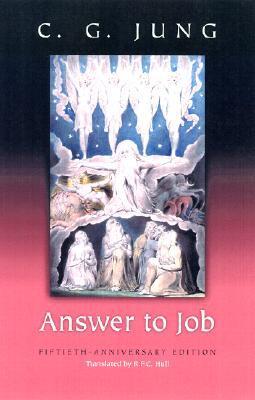What do you think?
Rate this book


121 pages, Paperback
First published January 1, 1952
From the human point of view Yahweh's behaviour is so revolting that one has to ask oneself whether there is not a deeper motive hidden behind it.It is clear that Jung reads Job through at least two paradigms, that of Christianity and that of his analytical psychology. But another undercurrent runs through and arguably animates the whole edifice, the spirit of Victorian politesse. Jung speaks as if “the human point of view” is the most self-evident thing in the world, and furthermore with the confidence that he is in full possession of such an artifact. Now don’t get me wrong, I believe it is absolutely the case that if we polled the generality of his contemporaries—or perhaps even ours—regarding the conduct of God towards Job (with the names changed), it would opine in the disapproving negative, sharing for the most part the cultural presuppositions required for the formation of such opinions. But as we are, like Jung, in the business of investigating root causes, we should not pretend as if his flabbergastion at the (perceived) sheer barbarity of the omniscient from which this whole instigation was derived were not itself a vital gear in some ulterior narrato-logic, some metastory whose resolution could only be achieved when its Jung character managed to reconcile his own internal turmoil with a satisfactory just-so object logic, the nigh-mathematical product of which being of course this very volume.
Yahweh is not split but is an antinomy—a totality of inner opposites—and this is the indispensable condition for his tremendous dynamism, his omniscience and omnipotence. Because of this knowledge Job holds on to his intention of “defending his ways to his face,” i.e., of making his point of view clear to him, since notwithstanding his wrath, Yahweh is also man’s advocate against himself when man puts forth his complaint.Given one is kind enough to entertain them, Jung’s trains of thought are quite the joyride. Bizarre and uncanny are the twists and turns required to conform the aforementioned paradigms with each other, and I am pleased to inform my readers that our beloved psychologist has more than enough erudition and panache to attempt such a task in good faith. Here one would do well to imagine himself in the writer’s shoes to get a richer impression of what was at stake for him, namely the relationship between religion, mythology, empirical science, and personal psychology. Above all this is an urgency to convey these discoveries, as if the fate of the future depended on it:
[Man] can no longer wriggle out of it on the plea of his littleness and nothingness, for the dark God has slipped the atom bomb and chemical weapons into his hands and given him the power to empty out the apocalyptic vials of wrath on his fellow creatures.Asks Jung: In what world would the life of Jesus be not a contingent event but a logical necessity? Answer to Job is an argument that that world is this world; perhaps we would do well to pay attention. Not because it’s correct per se (unlikely, let’s be honest), but because it demonstrates well the limits of scholarship, and because it’s fun.